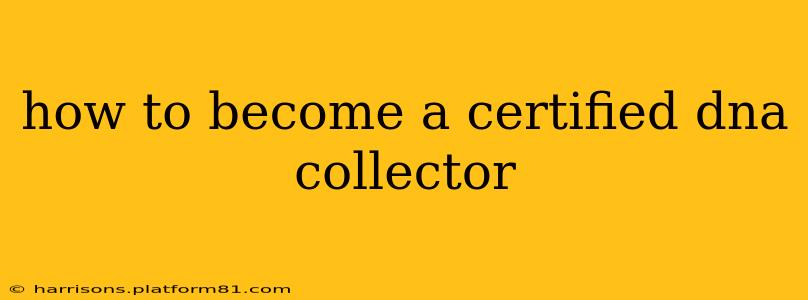The field of DNA collection is rapidly expanding, driven by advancements in forensic science, genetic genealogy, and medical research. Becoming a certified DNA collector requires dedication, training, and adherence to strict protocols. This guide explores the pathways to certification and the crucial skills required for this demanding yet rewarding career.
What Does a DNA Collector Do?
Before diving into the certification process, let's clarify the role of a DNA collector. DNA collectors are responsible for the proper and ethical collection of biological samples containing DNA. This involves meticulous techniques to avoid contamination and ensure the sample's integrity for downstream analysis. They work in diverse settings, including:
- Forensic Science: Collecting DNA evidence from crime scenes, adhering to strict chain-of-custody procedures.
- Medical Research: Collecting DNA samples from participants in clinical trials and research studies, ensuring informed consent and ethical handling.
- Ancestry and Genealogy Services: Collecting DNA samples for ancestry testing, explaining procedures clearly and ensuring customer confidentiality.
Is there a specific certification for DNA collectors?
There isn't one universally recognized "certified DNA collector" credential. The specific requirements and certifications depend heavily on the field and geographic location. Instead of a single certification, success often hinges on a combination of factors:
- Educational Background: A background in biology, forensic science, or a related field is highly beneficial. Many DNA collectors hold a bachelor's or even master's degree.
- Specific Training: Relevant training programs focusing on DNA collection techniques, legal procedures (especially in forensic science), and ethical considerations are crucial. These might be offered through universities, specialized training institutions, or professional organizations.
- Experience: Hands-on experience under the supervision of experienced professionals is essential. Internships, apprenticeships, or entry-level positions in related fields provide valuable practical skills.
- Professional Organizations: Joining professional organizations like the American Academy of Forensic Sciences (AAFS) can provide networking opportunities, access to continuing education, and exposure to best practices.
What kind of training is needed to collect DNA samples?
The type of training needed varies depending on the intended application of the DNA samples. For forensic purposes, comprehensive training in crime scene investigation, chain of custody, and legal procedures is essential. For medical research or genealogy, the emphasis shifts towards proper sample handling, informed consent, and patient privacy regulations like HIPAA (in the US). Specific training often includes:
- Sterile technique: Mastering methods to prevent contamination of samples.
- Sample collection methods: Learning techniques for collecting different types of samples (e.g., buccal swabs, blood samples).
- Sample labeling and storage: Properly labeling and storing samples to maintain integrity and traceability.
- Chain of custody: Understanding and meticulously documenting the handling and transfer of samples.
- Legal and ethical considerations: Adhering to relevant legal frameworks and ethical guidelines.
How can I find DNA collection training programs?
Locating relevant training programs requires proactive research. Start by searching online for:
- "Forensic science training programs": For careers in forensic DNA collection.
- "Biomedical science training": For roles in medical research or clinical settings.
- "DNA sample collection training": This might lead to specialized courses or workshops.
- University and college websites: Check the curriculum of biology, forensic science, and related departments.
Networking with professionals in the field can also provide valuable insights into training opportunities. Attending conferences or workshops offered by professional organizations is another excellent avenue.
What are the ethical considerations in DNA collection?
Ethical considerations are paramount in DNA collection. Key aspects include:
- Informed consent: Individuals must be fully informed about the purpose of DNA collection, how their data will be used, and their rights.
- Confidentiality: Maintaining the privacy and confidentiality of DNA samples and associated data is crucial.
- Data security: Protecting DNA data from unauthorized access and misuse is vital.
- Potential biases: Being aware of and mitigating potential biases in sample selection and data analysis.
What are the career prospects for DNA collectors?
The career prospects for skilled DNA collectors are positive, with increasing demand across various sectors. The field is expected to experience growth as technology advances and the applications of DNA analysis expand. Career progression may involve specialization in a particular area (e.g., forensic DNA analysis, medical genetics) or taking on supervisory roles.
This guide provides a comprehensive overview of how to become involved in the field of DNA collection. Remember that becoming a proficient and ethical DNA collector requires ongoing learning, skill development, and strict adherence to professional standards.
